The SSD Anthology: Understanding SSDs and New Drives from OCZ
by Anand Lal Shimpi on March 18, 2009 12:00 AM EST- Posted in
- Storage
PCMark Vantage
Next up is PCMark Vantage, another system-wide performance suite. For those of you who aren’t familiar with PCMark Vantage, it ends up being the most real-world-like hard drive test I can come up with. It runs things like application launches, file searches, web browsing, contacts searching, video playback, photo editing and other completely mundane but real-world tasks. I’ve described the benchmark in great detail before but if you’d like to read up on what it does in particular, take a look at Futuremark’s whitepaper on the benchmark; it’s not perfect, but it’s good enough to be a member of a comprehensive storage benchmark suite. Any performance impacts here would most likely be reflected in the real world.
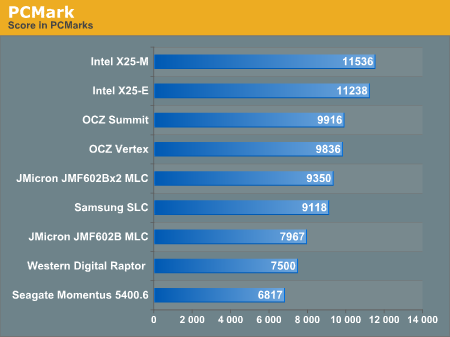
If you've paid attention to the synthetic tests from the previous pages, the results here should make sense. The Intel drives take the top two spots followed by the two OCZ drives, then the JMicron and conventional HDDs take up the rear.
While PCMark does do a great job of measuring disk performance, it doesn't seem to stress random write performance as much, allowing the JMicron drives to relax a bit.
Now let's look at the individual test suites:
The memories suite includes a test involving importing pictures into Windows Photo Gallery and editing them, a fairly benign task that easily falls into the category of being very influenced by disk performance.
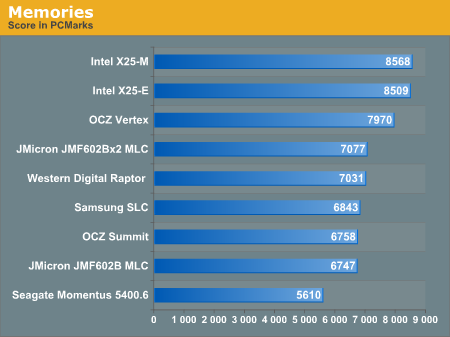
The TV and Movies tests focus on on video transcoding which is mostly CPU bound, but one of the tests involves Windows Media Center which tends to be disk bound.
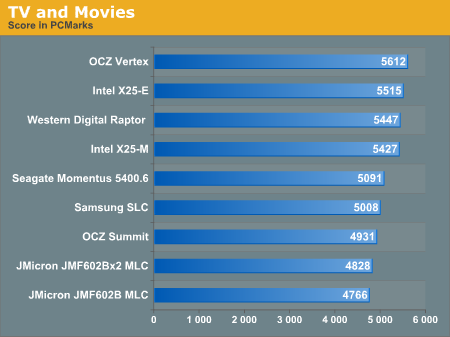
SSDs won't always dominate and in many cases they won't offer tangible improvements over a fast hard drive.
The gaming tests are very well suited to SSDs since they spend a good portion of their time focusing on reading textures and loading level data. All of the SSDs dominate here, but as you'll see later on in my gaming tests the benefits of an SSD really vary depending on the game. Take these results as a best case scenario of what can happen, not the norm.
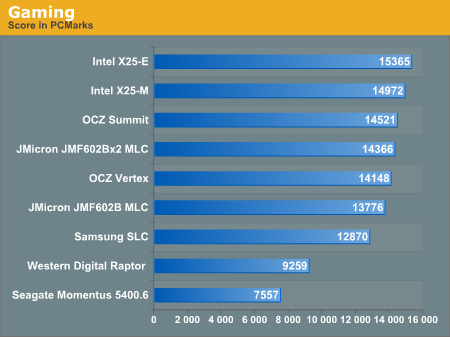
In the Music suite the main test is a multitasking scenario: the test simulates surfing the web in IE7, transcoding an audio file and adding music to Windows Media Player (the most disk intensive portion of the test).
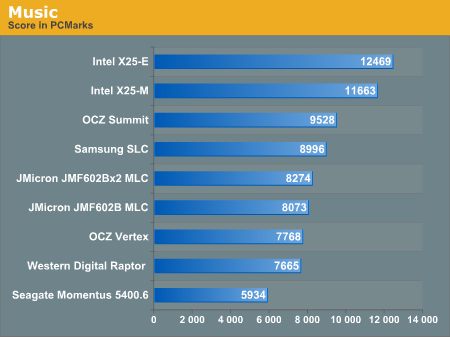
The Communications suite is made up of two tests, both involving light multitasking. The first test simulates data encryption/decryption while running message rules in Windows Mail. The second test simulates web surfing (including opening/closing tabs) in IE7, data decryption and running Windows Defender.

I love PCMark's Productivity test; in this test there are four tasks going on at once, searching through Windows contacts, searching through Windows Mail, browsing multiple webpages in IE7 and loading applications. This is as real world of a scenario as you get and it happens to be representative of one of the most frustrating HDD usage models - trying to do multiple things at once. There's nothing more annoying than trying to launch a simple application while you're doing other things in the background and have the load take seemingly forever.
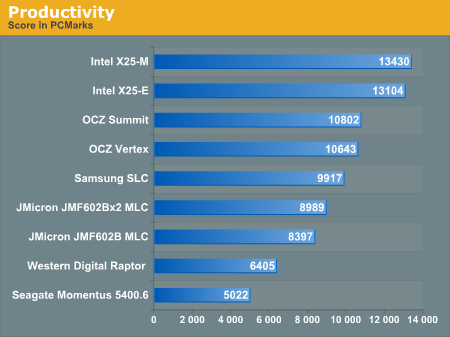
The results here are the best characterization of my personal experience with the drives. The Intel drives are the fastest, a good 25% faster than the Summit or Vertex. Next up are the OCZ drives, with the Vertex dangerously close to the Summit. The older Samsung SLC is next in the standings, followed by the JMicron drives. There's a healthy combination of reads and writes going on here which benefits all of the SSDs, including the less desirable ones.
The final PCMark Vantage suite is HDD specific and this is where you'll see the biggest differences between the drives:
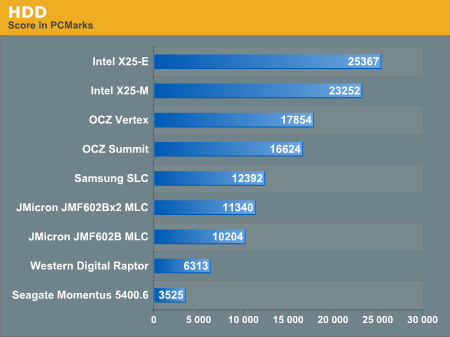
Again we're seeing the sort of breakdown we'd expect. The Intel drives come out ahead, while the Vertex is the best bang for your buck.










250 Comments
View All Comments
GlItCh017 - Wednesday, March 18, 2009 - link
I just wanted to comment that the backstory portion to this article is simply the most interesting part to an article (or almost even an article inside the main article). On top of that, it is easily the most interesting article I have ever read simply because of that section. Really really must say that I enjoyed reading it!radguy - Wednesday, March 18, 2009 - link
I have been waiting for this one for a while and it was very informative. Thank you very much for it. I did pick up one of the patriot warp drives for my netbook. I was really happy until I installed avg free. So not running an antivirus on it anymore but I have drive image backup incase it goes bad. Overall pretty happy as it was only 80 bucks if I get my mir.I think I'm going to wait until windows 7 till I upgrade my primary desktop. 2 of those vertexs in raid 0 would be sweet though.
sleepeeg3 - Wednesday, March 18, 2009 - link
They were one of the first SSDs you reviewed and they use their own controller. How does their random write performance compare to everything else out now?These reviews made me totally reassess the purchase of the two Samsungs I bought. I had no idea the random writes on the Samsung drives were so bad. Other reviews show the Samsung drives doing better or at least near the X25-M in write tests: http://www.techreport.com/articles.x/15433/6">http://www.techreport.com/articles.x/15433/6 However, those tests probably would have been somewhat sequential.
nubie - Wednesday, March 18, 2009 - link
Grammatically awkward sentence on Page 21:"so if you own one of these drives - you owned a fixed version."
The tense is incorrect (own/owned). I think "own a fixed version" is still awkward, perhaps "you have the fixed version", also the "so" may be superfluous. You can replace the ", so if" with a "; if". Here is how I might re-write the sentence:
"The old firmware never shipped thanks to OCZ's quick acting; if you own one of these drives - you have a fixed version."
(I am not an expert, so feel free to correct me if I am wrong.)
Awesome article btw, thanks for setting me straight on SSD, I have been steering clear of them. I hope soon you can review SSD's and most are good to excellent. :)
Flyboy27 - Wednesday, March 18, 2009 - link
This article has answered every question I've had regarding SSDs recently. Thanks Anand!Flyboy27 - Wednesday, March 18, 2009 - link
If a 120gb Vertex was around $250 I would get one yesterday. I suppose I can wait though.7Enigma - Thursday, March 19, 2009 - link
For me, 2 60's or 2 80's for around that price and I'm sold. Want the Raid0.kgwagner - Wednesday, March 18, 2009 - link
I almost didn't read this article, as everybody and their brother seems to want to explain SSDs these days and most of the articles aren't much more than glorified press releases. But, this one truly took the drives to task and presented some valid information and explanations about the state of the art and where it needs to go. Kudos, Anand. Awesome show. Good job.Mr Perfect - Wednesday, March 18, 2009 - link
"Needless to say, there was some definite fallout from that review. I’m used to negative manufacturer response after a GPU review, but I’m always a bit surprised when it happens in any other segment."Obviously you can't make a business out of irritating manufacturers, but when there really are issues, the readers want to know about them. After all, that's why we come here!
gwolfman - Wednesday, March 18, 2009 - link
You own Anand. Keep up the good work. I've seen you cited from many sites about the work you've done, in particular with SSDs. Best article I've read in months!